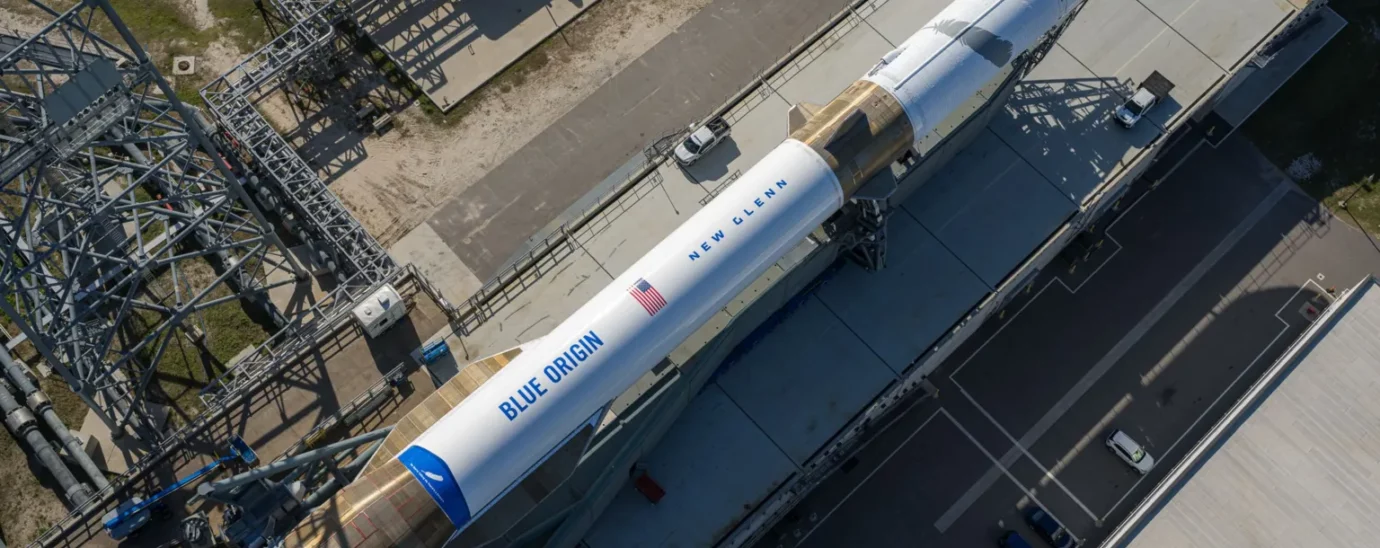Rocket launch challenges Elon Musk’s space dominance

“Congratulations on reaching orbit on the first attempt!” Musk wrote in a post to Bezos on X.
Dave Limp, CEO of Bezos’s space company Blue Origin, said he was “incredibly proud”.
“We’ll learn a lot from today and try again at our next launch this spring,” he added.
Bezos’s team overcame technical barriers that caused delays earlier this week when ice formation halted a launch.
Blue Origin’s employees and crowds gathered near Cape Canaveral cheered as the 98 meters-high rocket hurtled into orbit.
But the company failed to land New Glenn’s main rocket engine, or booster, onto a platform in the Atlantic Ocean.
It had hoped that the booster would be reusable for future launches but after about 20 minutes of flight, the company confirmed it had lost the engine.
Bezos’s company Blue Origin has struggled to match the pace set by SpaceX. But this launch will be seen as a major step forward for the business.
The New Glenn rocket was named after John Glenn, the first American astronaut to orbit Earth more than 60 years ago.
The rocket is more powerful than SpaceX’s most commonly used rocket, the Falcon 9. It can also carry more satellites, and Bezos wants to use it as part of his Project Kuiper, which aims to deploy thousands of low-earth satellites to provide broadband services.
That project would compete directly with Musk’s Starlink service.
Blue Origin Media New Glenn is 98 metres highBlue Origin Media
New Glenn is 98 metres high
Jeff Bezos founded Blue Origin 25 years ago, claiming he wanted “millions of people working and living in space.”
For years the venture has sent a smaller, reusable rocket called New Shepard to the edge of Earth’s atmosphere. It has carried passengers and payloads, including Bezos himself in 2021.
But Blue Origin has been dramatically outperformed by SpaceX, which launched its rockets 134 times last year.
And SpaceX’s new generation of rocket, called Starship, is more powerful still. The company hopes to launch it in its seventh test flight later today.
Blue Origin’s rocket is bigger than SpaceX’s most commonly used rocket
Starship is even bigger than Blue Origin’s New Glenn
Some experts say a successful New Glenn rocket will create real competition between the two companies and could drive down the costs of space operations.
“What you are going to see are these two companies challenge each other to make even greater strides,” suggests Dr Simeon Barber at the Open University in the UK.
Governments have historically spent billions on building rockets and sending missions into space.
But US space agency NASA is increasingly moving away from relying only on public money and has issued huge contracts to private companies to provide rockets and other space services.
Elon Musk’s SpaceX has already received billions of dollars worth of space contracts.
His close relationship with the next US president, Donald Trump, could strengthen his company further.
Some experts say a successful New Glenn rocket will create real competition between the two companies and could drive down the costs of space operations.
“What you are going to see are these two companies challenge each other to make even greater strides,” suggests Dr Simeon Barber at the Open University in the UK.
Governments have historically spent billions on building rockets and sending missions into space.
But US space agency NASA is increasingly moving away from relying only on public money and has issued huge contracts to private companies to provide rockets and other space services.
Elon Musk’s SpaceX has already received billions of dollars worth of space contracts.
His close relationship with the next US president, Donald Trump, could strengthen his company further.
Some experts say a successful New Glenn rocket will create real competition between the two companies and could drive down the costs of space operations.
“What you are going to see are these two companies challenge each other to make even greater strides,” suggests Dr Simeon Barber at the Open University in the UK.
Governments have historically spent billions on building rockets and sending missions into space.
But US space agency NASA is increasingly moving away from relying only on public money and has issued huge contracts to private companies to provide rockets and other space services.
Elon Musk’s SpaceX has already received billions of dollars worth of space contracts.
His close relationship with the next US president, Donald Trump, could strengthen his company further.
Some experts say a successful New Glenn rocket will create real competition between the two companies and could drive down the costs of space operations.
“What you are going to see are these two companies challenge each other to make even greater strides,” suggests Dr Simeon Barber at the Open University in the UK.
Governments have historically spent billions on building rockets and sending missions into space.
But US space agency NASA is increasingly moving away from relying only on public money and has issued huge contracts to private companies to provide rockets and other space services.
Elon Musk’s SpaceX has already received billions of dollars worth of space contracts.
His close relationship with the next US president, Donald Trump, could strengthen his company further.
Some experts say a successful New Glenn rocket will create real competition between the two companies and could drive down the costs of space operations.
“What you are going to see are these two companies challenge each other to make even greater strides,” suggests Dr Simeon Barber at the Open University in the UK.
Governments have historically spent billions on building rockets and sending missions into space.
But US space agency NASA is increasingly moving away from relying only on public money and has issued huge contracts to private companies to provide rockets and other space services.
Elon Musk’s SpaceX has already received billions of dollars worth of space contracts.
His close relationship with the next US president, Donald Trump, could strengthen his company further.
